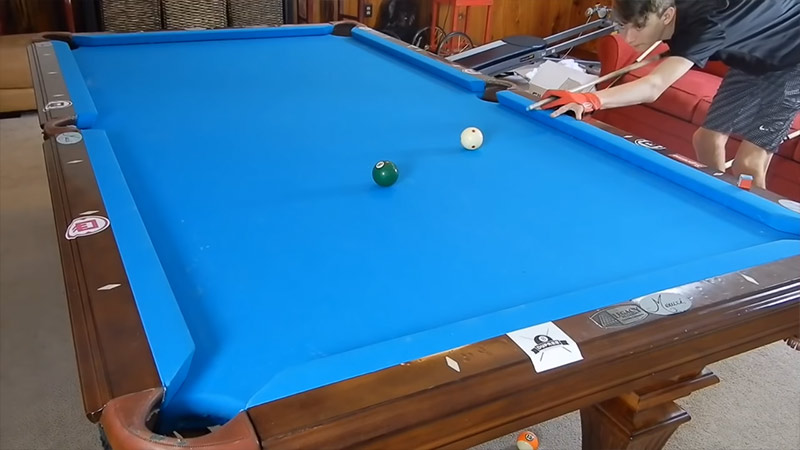The world of cue sports, particularly pool, is a realm of precision, strategy, and skill.
Amidst the strategies and artistry, there exists an infamous nemesis that every pool player dreads – the table scratch. But what is a table scratch in the pool?
It’s more than just the cue ball finding its way into a pocket, and understanding it is crucial for anyone seeking success on the green felt.
In this comprehensive guide, we’ll delve into the intricacies of a table scratch in the pool. From how it occurs and the consequences it carries to strategies for avoiding it, we’ll cover it all.
Whether you’re a seasoned pool shark looking to refine your skills or a beginner just starting out in this beloved cue sport, this post will help you navigate the challenges of table scratches. Stay focused.
What Is a Table Scratch in Pool?
For many different reasons, we want to learn what is considered a scratch in the pool. A table scratch in the pool, often referred to as a “cue ball scratch” or simply a “scratch,” occurs when the cue ball is inadvertently pocketed during a player’s shot.
This is considered a foul in most cue sports games like eight-ball and nine-ball.
When a table scratch occurs, the opposing player gets ball in hand, which means they can place the cue ball anywhere on the table for their next shot.
Table scratches can result from poor cue ball control, misjudgment of angles, or accidentally striking the cue ball too hard or in an unintended direction.
Skillful players aim to avoid table scratches to maintain control of the game and set themselves up for scoring opportunities.
Understanding the rules and strategies to prevent table scratches is crucial for success in the game of pool.
How a Pool Table Scratch Occurs?
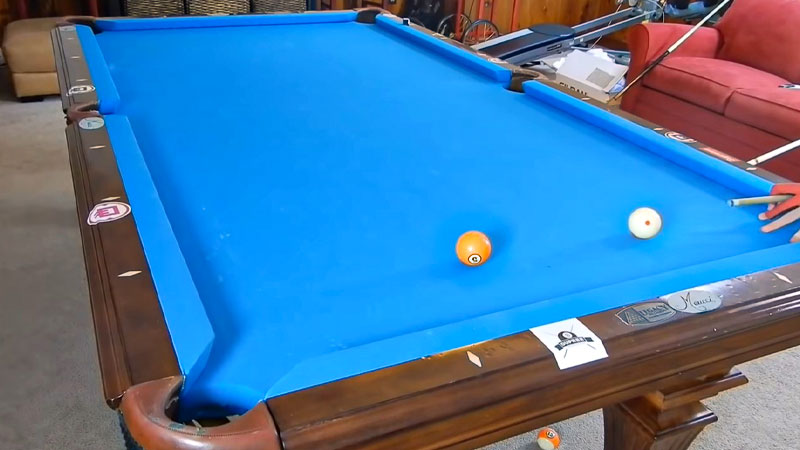
A pool table scratch, also known as a cue ball scratch, can occur for various reasons in cue sports like eight-ball, nine-ball, or straight pool.
Here’s how it typically happens:
Overpowered Shot
One common way a cue ball scratch occurs is when a player applies excessive force to the cue ball.
If the cue ball is struck too hard, it may rebound off an object ball or cushion and then accidentally find its way into a pocket.
Poor Cue Ball Control
Inaccuracy in cue ball control is another reason for scratches. When a player fails to strike the object ball at the intended angle or position, it can result in the cue ball traveling unpredictably and ending up in a pocket.
Misjudgment of Angles
Estimating angles accurately is crucial in pooling. A player may misjudge the rebound angle of the cue ball after contacting an object ball, causing the cue ball to head toward a pocket instead of staying in the desired position.
Accidental Side Spin
When players use side spin (English) on the cue ball to shape the path of the cue ball, they risk a scratch if they apply too much or too little spin.
Excessive side spin can cause the cue ball to veer unexpectedly into a pocket.
Kissing Balls
Sometimes, when two balls, including the cue ball, are close together, they may kiss or collide during the shot. This collision can impart an unintended motion to the cue ball, sending it toward a pocket.
Avoiding cue ball scratches requires precise control, careful consideration of angles, and a good understanding of the physics of the game.
Consequences of a Table Scratch Pool
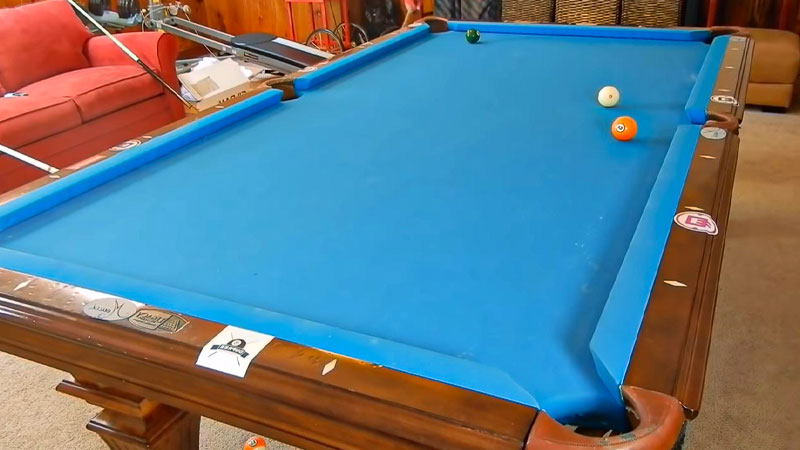
A table scratch in the pool can have several consequences, both in terms of gameplay and score. Here are some key consequences of a table scratch:
Ball-in-Hand for Opponent
The primary consequence of a table scratch is that the opposing player gains “ball-in-hand” or the ability to place the cue ball anywhere on the table for their next shot.
This gives them a significant advantage as they can set up their shot for the best possible position, making it easier for them to clear the table or set up a winning shot.
Opportunity for the Opponent
With ball-in-hand, the opponent can strategically position the cue ball to their advantage, potentially leading to a higher chance of pocketing balls and winning the game.
This can result in the loss of a significant lead or even the loss of the game for the player who scratched.
Foul Count and Game Strategy
In some variations of pool, excessive fouls can lead to the loss of the game. A table scratch counts as a foul, and accumulating fouls can give the opponent an automatic win.
This makes it crucial for players to avoid scratches and maintain a clean game strategy.
Momentum Shift
Beyond the immediate consequences of the table scratch, it can also lead to a shift in momentum.
The player who scratched may become frustrated or demoralized, while the opponent gains confidence and momentum, potentially affecting their performance in subsequent turns.
Tactical Advantage
In addition to the above consequences, the opponent may use the opportunity to strategically place the cue ball in a way that makes it difficult for the player who scratched to make a comeback.
This tactical advantage can lead to further difficulties in turning the game around.
To succeed in the pool, players need to be aware of the consequences of a table scratch.
They should strive to minimize their occurrence through precise cue ball control and sound strategy, as a single scratch can have a significant impact on the outcome of the game.
Tips for Avoiding Pool Table Scratches
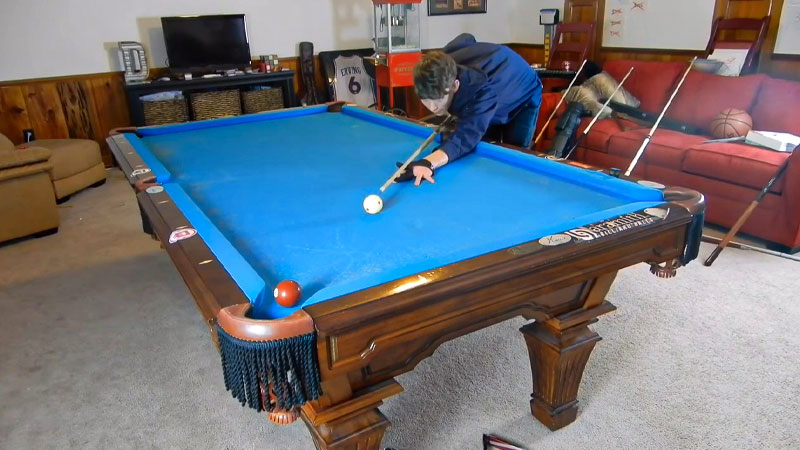
To avoid pool table scratches, consider these tips that focus on improving your cue ball control and overall gameplay:
Control Cue Ball Speed
One of the primary causes of table scratches is striking the cue ball too hard. To prevent this, focus on controlling the speed of your shots.
Use a gentle and consistent stroke, adjusting the power as needed for each shot.
Overpowered shots are more likely to lead to cue ball scratches, so aim for a smoother and more controlled approach.
Precise Position Play
Plan your shots carefully and be mindful of the cue ball’s path. Avoid risky positions where the cue ball could easily scratch.
Choose positions that offer a clear path for the cue ball to travel away from pockets. Precise position play minimizes the chances of accidental scratches.
Angle Awareness
Understanding the rebound angles of balls after they collide is crucial. Misjudging these angles can result in cue ball scratches.
Improve your angle awareness by practicing and observing how balls react upon contact.
This will help you make more accurate shots and avoid scratches caused by unexpected cue ball movement.
Manage English (Side Spin)
Using side spin, also known as English, can enhance your shots, but it can also introduce unpredictability.
Be cautious when applying English, as excessive spin can lead to unexpected cue ball movement. Practice controlling the amount of English you use and its direction to reduce the risk of scratches.
Stay Composed
Emotional composure is essential in the pool. Stay calm and composed, especially after a scratch. Frustration and impulsive decisions can lead to more mistakes.
Take a deep breath, refocus, and plan your next shot strategically. Learn from your mistakes and use them as opportunities to improve your game.
By implementing these tips and consistently practicing your cue ball control and shot selection, you can significantly reduce the likelihood of table scratches and improve your overall performance in the pool.
Common Misconceptions About Pool Table Scratches
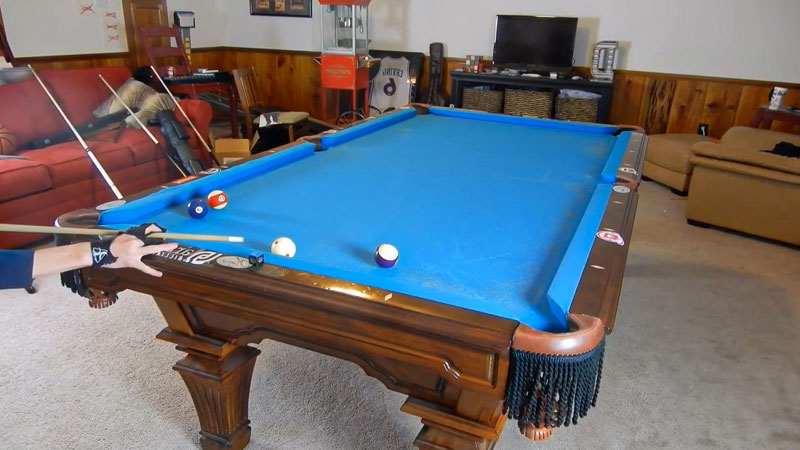
Misconceptions about pool table scratches are common, often leading to misunderstandings about the rules and strategies of the game.
Here are some of the common misconceptions:
A Scratch Always Means a Loss
One of the most prevalent misconceptions is that a table scratch automatically results in a loss for the player who scratched.
While it is a foul that can have significant consequences, it doesn’t necessarily lead to an immediate loss.
The opponent typically gets ball in hand, but the outcome of the game depends on the players’ skill and strategy. It is possible to recover from scratch and still win the game.
Only the Cue Ball Can Be Scratched
Some players believe that scratches only apply to the cue ball going into a pocket.
However, in various pool games like eight-ball or nine-ball, pocketing the wrong object ball, such as the eight-ball in the eight-ball pool, can also result in a scratch.
Understanding the specific rules of the game being played is crucial to avoid this misconception.
Scratches Are Always Deliberate Fouls
Another misconception is that scratches are intentional fouls. In reality, many scratches occur due to a lack of cue ball control, misjudgment of angles, or accidental errors rather than deliberate fouls.
Players are often trying to avoid a scratch, but it can happen unintentionally.
Scratches Are the Worst Foul
While table scratches are certainly significant fouls, there are other fouls in the pool that can be equally or more detrimental.
For example, sinking the cue ball and another object ball in some games can result in a loss of the game (e.g., scratching on the eight ball in the eight-ball pool).
Different pool games have various rules regarding fouls, and some can be more severe than a simple scratch.
Scratches Are Always Due to Poor Skill
It’s not always a lack of skill that leads to scratches. External factors like the table’s condition, cue condition, or even distractions can play a role.
Skilled players can also experience scratches, highlighting the importance of constant improvement and practice in the pool.
Understanding the nuances of pool rules and the subtleties of table scratches can help players make informed decisions and avoid these common misconceptions.
FAQs
What are the table scratch rules?
Table scratch rules typically refer to rules in cue sports like pool or snooker. They involve scratching the cue ball, where the cue ball goes into a pocket. Specific rules vary between games.
What is a scratch in the pool?
In a pool, a scratch occurs when the cue ball is pocketed by the player during their shot. It’s a foul, and the opposing player gets the ball in hand, meaning they can place the cue ball anywhere.
How to Deal with Pool Table Scratches?
To deal with pool table scratches, improve your skills to avoid fouls. When a scratch occurs, the opponent gets the ball in hand, which can be a significant advantage. Practicing and learning better control is key.
Should I call a professional to fix the Pool Table Scratches?
Calling a professional to fix pool table scratches is recommended for major damage, like rips in the cloth or structural issues. For minor issues, DIY solutions may suffice.
Can I fix the Pool Table Scratches at home?
You can fix minor pool table scratches at home. Repair options include using a pool table repair kit to fix small cloth imperfections, leveling the table, or addressing minor cosmetic issues.
For major problems, it’s best to consult a professional.
Wrapping Up
A table scratch in pool is not just a mere foul; it’s a game-changer. It can shift momentum, turn the tide, and lead to victory or defeat.
By understanding the dynamics of this common but often misunderstood aspect of the pool, you gain a strategic edge over your opponents.
From controlling cue ball speed to precise position play and managing English, mastering the art of avoiding scratches elevates your game.
Whether you play recreationally with friends or compete at a professional level, table scratches are a universal challenge.
This guide has equipped you with the knowledge and strategies needed to minimize the risk of table scratches and seize the initiative in your next game.
Now, armed with this newfound expertise, go ahead and sink those balls with confidence, knowing that table scratches are a thing of the past. Thank you so much.

